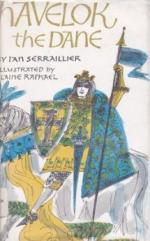There he stopped, and I knew enough to understand that we were in some peril unless a shift of wind came very soon, since the shore was under our lee now, if by good luck we were not carried straight into the great river itself. So for an hour or more I watched, and all the time it seemed that hope grew less, for the sea grew shorter, as if against tide, and ever its colour was browner with the mud of the Trent and her sisters.
Presently, as I clung to the rail, there seemed to grow a new sound over and amid all those to which I had become used—as it were a low roaring that swelled up in the lulls, and sank and rose again. And I knew what it was, and held up my hand to my father, listening, and he heard also. It was the thunder of breakers on a sandy coast to leeward.
He put his whistle to his lips and called shrilly, and the men saw him if they could not hear, and sprang up, clawing aft through the water that flooded the waist along the rail.
“Breakers to leeward, men,” he cried “we must wear ship, and then shall clear them. We shall be standing right into Humber after that, as I think.”
Arngeir heard the men trampling, if not the whistle, and he was with us directly, and heard what was to be done.
“It is a chance if the yard stands it,” he said, looking aloft.
“Ay, but we cannot chance going about in this sea, and we are too short of men to lower and hoist again. Listen!”
Arngeir did so, and heard for the first time the growing anger of the surf on the shore, and had no more doubt. We were then running with the wind on the port quarter, and it was useless to haul closer to the wind on that tack, whereas if we could wear safely we should be leaving the shore at once by a little closer sailing.
“Ran is spreading her nets,” said Arngeir, “but if all holds, she will have no luck with her fishing.” [6]
Then we manned the main sheet and the guys from the great yards, but we were all too few for the task, which needed every man of the fifteen that we had sailed with. There was the back stay to be set up afresh on the weather quarter for the new tack also, and three men must see to that.
We watched my father’s hand for the word, and steadily sheeted home until all seemed to be going well. But the next moment there was a crash and a cry, and we were a mastless wreck, drifting helplessly. Maybe some flaw of wind took us as the head of the great sail went over, but its power was too much for the men at guys and back stay, and they had the tackle torn through their hands. The mast snapped six feet above the deck, smashing the gunwales as it fell forward and overboard, but hurting none of us.
Then a following sea or two broke over the stern, and I was washed from the poop, for I had been at the sheet, down to the deck, and there saved myself among the fallen rigging, half drowned. One of the men was washed overboard at the same time, but a bight of the rigging that was over the side caught him under the chin, and his mates hauled him on board again by the head, as it were. He was wont to make a jest of it afterward, saying that he was not likely to be hanged twice, but he had a wry neck from that day forward.




